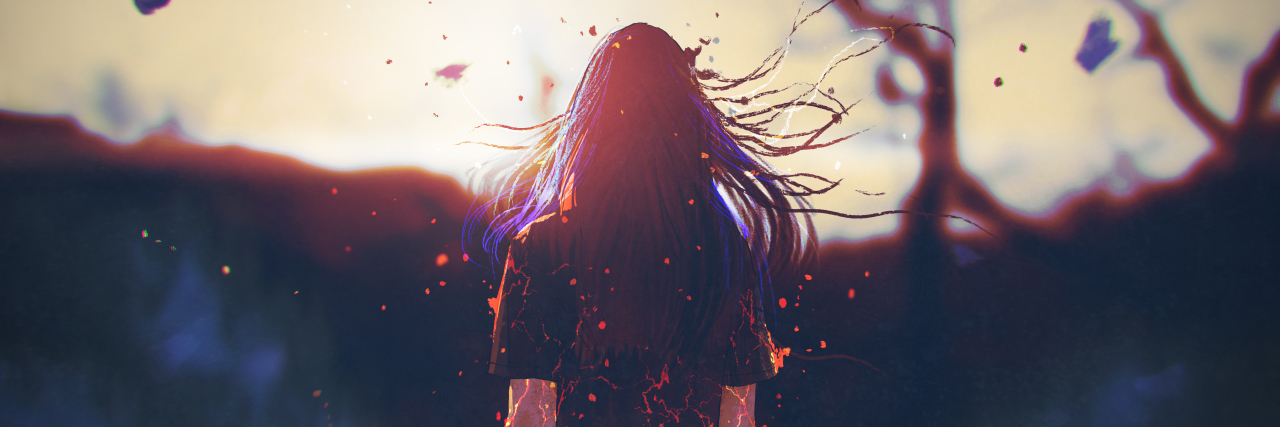All mental illnesses come with their own different symptoms.
Some are similar, some are not.
With schizoaffective disorder bipolar type, it’s like fighting two battles within your mind. You’re fighting the bipolar symptoms, all while fighting the schizophrenia symptoms. One of the hardest parts about letting people know about your condition is the misconceptions and questions regarding your symptoms. People automatically assume that you see the wildest things when you’re schizophrenic and that you only experience visual hallucinations that aren’t all that bad.
I experience visual, auditory and tactile hallucinations, and some of them are terrifying. Accompanied with the hallucinations are the symptoms related to bipolar disorder-mania and depression. It’s like a battle in which symptoms get stronger each day. Explaining all of the symptoms can sometimes be like pulling teeth because of how elaborate each symptom can be.
Schizophrenia
It can be incredibly difficult to explain hallucinations or delusions to other people. Some people think you just have minor, easy to manage hallucinations, while others think you experience “cool” hallucinations.
This can be frustrating because although you can experience minor hallucinations, there are times you experience terrifying, bone-chilling, sending you into tears hallucinations. I’ve seen demonic figures that had me absolutely frozen in place because they were that terrifying.
It’s hard to explain these hallucinations to people because they have no idea what you see or feel. They can use their imagination to the best of their ability, but they won’t be able to experience what you do. There are a lot of people who don’t understand the magnitude of an impact these hallucinations can have on a person. Sometimes they can be debilitating and, as I’ve said before, can make you freeze in place.
I find delusions the hardest to explain. My mind is convincing myself of something that can be completely illogical and explaining that to someone who knows it’s illogical can make you feel uneasy. You think it’s completely true, but someone who doesn’t experience delusions — someone with outside perspective — can find it immensely difficult to understand. While you’re fighting this, the bipolar symptoms are trying to fight their way into the spotlight.
Bipolar Disorder
The difficulty of describing your bipolar symptoms can be pretty on par with schizophrenia. Sometimes it feels like you’re on top of the world, then the next minute it feels like you’re drowning and trying to keep your head above water.
When you are manic, you feel invincible. Then, when you come out of the mania, you feel like you are unable to do anything; the euphoric feeling of the mania is gone. It’s hard to describe these symptoms to other people simply because their mood is stable. It’s difficult trying to explain that some days you are riskier, happier, more impulsive and more susceptible to do things you normally wouldn’t do. Some people will question why you’re like this because it’s not who “you” are. It’s the mania of the illness.
When you come down from the mania and enter the dreaded depressive states, all you want to do is sleep. You lose interest in the things you love doing and you are unable to do simple tasks like get out of bed or brush your hair. This is even more difficult and frustrating to explain because a week ago, you were on the total opposite end of the spectrum. I’ve had people ask why I can’t, “Just go back to how I was a while ago.” If I could stabilize my mood that easily, I would be ecstatic; but sadly, it’s not that easy.
Double the Fight
The symptoms of both schizophrenia and bipolar disorder are so complex. Because of this complexity, it can make describing your symptoms a lot more difficult. You have on one side: hallucinations, delusions and dissociative states, and then the other side: mania and depression of bipolar disorder. Your mind is having two battles simultaneously.
Trying to explain two different disorders’ symptoms is not an easy task. Dealing with the symptoms comes with a plethora of misconceptions, ignorance and stigmas. I’ve been labeled “crazy” and “unstable” because of my disorder. I hear the word crazy often in reference to a lot of mental illnesses. This is due to lack of information and education on the illness. Hopefully, with time, the stigma surrounding not just schizoaffective disorder but all mental illnesses will deteriorate. Together, we can fight it.
This story originally appeared on The Bipolar Wave.
GettyImages via Grandfailure

